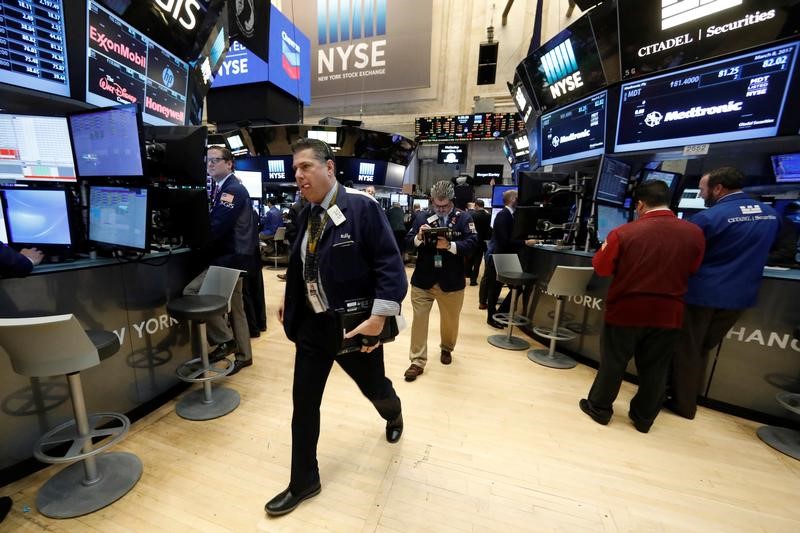Image: Traders work on the floor of the New York Stock Exchange (NYSE) in New York, U.S., March 8, 2017. REUTERS/Brendan McDermid
By Herbert Lash
NEW YORK (Reuters) – Crude oil extended a slump on Thursday on news of record-high U.S. stockpiles, dragging on equity markets as energy stocks slid, while bets the Federal Reserve will raise U.S. interest rates next week weighed on gold and industrial metals.
Wall Street rose at the close to end marginally higher on speculation a widely anticipated labor market report on Friday will show U.S. payrolls growth in February was far more than economist forecast.
Rising expectations the Fed will boost rates next week lifted financial shares whose gains led major indexes in Europe to close higher with the exception of the mining- and energy-rich FTSE 100 in London, which fell 0.27 percent.
The FTSEurofirst 300 index of leading regional shares in Europe closed up 0.1 percent to 1,470.65.
Expectations of higher rates lifted yields on two- and five-year U.S. Treasury notes to highs last seen in August 2009 and April 2011, respectively, as a bond market sell-off accelerated.
Oil prices slid to their lowest since late November as record-large U.S. crude inventories kept sentiment weak and pointed to a global glut despite supply cuts by the Organization of the Petroleum Exporting Companies.
Brent crude, the global benchmark, fell 92 cents to settle at $52.19 a barrel, while U.S. light crude settled down $1.00 to $49.28.
Oil has traded in a tight range this year of about $50 to $55 a barrel and looks poised for further declines.
Royal Dutch Shell Plc and BP, along with miners BHP Billiton and Glencore, pushed stocks lower in London.
MSCI’s 46-country all-world stock index fell for a sixth consecutive day, the longest slide since the start of 2016. The global benchmark fell 0.17 percent, down from an all-time high set just over a week ago.
Johnson & Johnson, Exxon Mobil and Wells Fargo Co led Wall Street higher.
The Dow Jones Industrial Average rose 2.46 points, or 0.01 percent, to end at 20,858.19. The S&P 500 gained 1.89 points, or 0.08 percent, to 2,364.87 and the Nasdaq Composite added 1.255 points, or 0.02 percent, to 5,838.81.
“The market went positive at the very end in anticipation of what’s going to happen tomorrow,” said Ken Polcari, direct of the NYSE floor division at O’Neil Securities in New York.
The outlook for U.S. stocks remains bright on the eighth anniversary of the current bull market, said Michael Arone, chief investment strategist at State Street Global Advisors in Boston.
Signs the market could turn bearish, such as frequent corrections of 5 percent or more, a rise in interest rates above the inflation rate and widening credit spreads are not visible, he said.
“I do think the market could continue to rise, particularly if the economic data and earnings continue to strengthen,” Arone said. However, “the sand in this particular bull market hourglass is getting smaller, not greater.”
The dollar fell against a basket of major currencies as the euro gained after European Central Bank chief Mario Draghi suggested it was less necessary to prop up the market through ultra-loose monetary policy.
Draghi said the ECB removed a reference to using all available measures to induce growth and inflation “because the sense of urgency is not there.”
The euro rose above $1.06 during Draghi’s remarks, reversing declines. It was last up 0.36 percent at $1.0577.
The dollar index, which tracks the greenback against the euro and five other major world currencies, fell 0.01 percent at 101.970.
Gold sank to a five-week low, with analysts expecting further losses as investors become increasingly confident that U.S. interest rates will rise.
U.S. gold futures settled down 0.51 percent to $1,203.20 an ounce.
(Reporting by Herbert Lash; Editing by Nick Zieminski and James Dalgleish)


